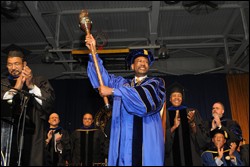ohnson C. Smith University (JCSU) in Charlotte, NC, inaugurated Ronald Lee Carter as the historically Black Presbyterian college’s 13th president on April 16 with several days of activities.
Carter assumed the presidency on July 1 of last year, succeeding Dorothy Cowser Yancy, who retired after 14 years. Carter’s investiture coincided with the college’s 142nd Founders’ Day.
JCSU was founded in 1867 by Rev. Samuel Alexander and Rev. W.L. Miller — two Presbyterian ministers — during a meeting of then Catawba Presbytery in the church basement of the Charlotte congregation now known as First United Presbyterian Church.
The Rev. Gregory M. Busby Sr., pastor of First United Church, opened the inauguration, held in the college’s gymnasium, saying, “Johnson C. Smith University has established a reputation for preparing men and women for leadership and service.”
Busby noted present and future collaborations between the congregation and the JCSU community, including Carter’s filling of the First United pulpit last fall at the church’s homecoming. “I’m excited about forging partnerships,” Busby said, “based on mutual ties of the Presbyterian founders … and building into the 21st century.”
In Carter’s inaugural speech, he called the traditions and past accomplishments of the university “stepping stones for future progress.” Busby agreed, saying the relationship between the church and the university “one of honoring the past, but focusing on how to make history now.”
Carter promoted his vision for the university as a “campus climate conducive for students who grew up in foster care to be successful.” Carter himself has served both as a long-term foster father and a short-term emergency caregiver. Each year, 20,000 individuals age out of foster care in the United States, according to the Network on Transitions to Adulthood, a University of Pennsylvania-based consortium of researchers.
Since his arrival, Carter said, he has met several JCSU students who had lived in foster care as children or been emancipated from foster care at the age of 18. His personal passion for the care and success of foster children, he said, has transformed into an institutional priority.
Carter jump-started his initiative in February when the college hosted a campus visit for 300 foster youth from Charlotte-area high schools. The university is now seeking resources that will allow students to live on campus year-round and to support them with academic and career preparation services, thus extending an environment at JCSU that many staff and students describe as a supportive and caring family.
Another initiative Carter emphasized seeks to provide new educational avenues and civic-engagement opportunities for students through the Smith Institute for Applied Research.
“Centers of Excellence” within the Institute focus on diversity, minority health, Homeland Security-Science Technology Engineering Mathematics (HS-STEM), and global education.
“It’s exciting to have a comprehensive program of global education to understand [the global economy] and work within it,” Carter said.
Each Center will be equipped with a fellow, a faculty researcher, and student researcher.
To demonstrate his enthusiasm for global education — he wants every student to have a passport — Carter led a two-week passport registration drive, with JCSU paying the fees for applications and bringing U.S. Postal Service staff to campus.
Twelve students won all-expense paid trips to Italy during the drive. The trips will take place as soon as the school year ends this month.
This year, U.S. News and World Report ranked JCSU among the top ten of “America’s Best Black Colleges,” also known as Historically Black Colleges and Universities (HBCUs).
Carter said he wants to take the university farther, to “demonstrate what an HBCU is for the twenty-first century.”

